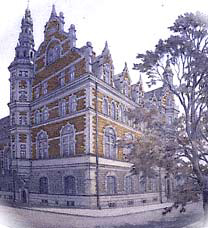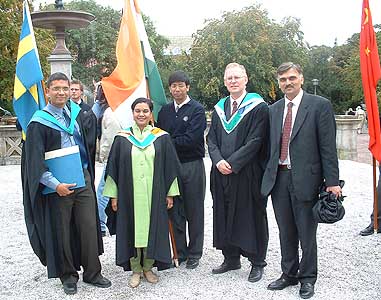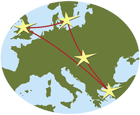SWEDISH SOUTH ASIAN STUDIES NETWORK
 International
Institute for Industrial Environmental Economics, IIIEE, at Lund University:
International
Institute for Industrial Environmental Economics, IIIEE, at Lund University:
Information on the Masters Programme
Postal address: Box 196, S-221 00 Lund, Sweden
Visiting address: Tegnérsplatsen 4
Web page: http://www.iiiee.lu.se
Contact person: Asst. Professor Lars Hansson, ph: +46 (0)46 222 0241
The Swedish Parliament founded the Institute by passing
the Government proposal during June 1994. The Institute was founded during
autumn, and the Institute moved to its present premises (on photo) in
March 1995. The Institute is part of Lund University, and is a special
organisation that is presided over by the Vice-Chancellor. The Institute
has separate board members and issues both MSc and PhD degrees. Lecturers
at Lund University assist the Institute in carrying out some of the courses
offered in its Masters Programme.
IIIEE celebrated its 10th Anniversary on Thursday 19 May 2005, with an
Open house and a conference on ”Sustainable
Consumption and Production, What to ask from Education and Research?”.
Read
the programme for the anniversary conference.
Research at the IIIEE concentrates on furthering the understanding and
development of policies, strategies, and instruments to promote preventive
approaches to environmental problems in society. It also contributes to
the support and facilitation of governmental, industrial, and individual
initiatives towards cleaner production. The main focus is on applied research,
with the goal of reaching short- and long-term results that can be used
in practice by decision-makers at all levels in society. To achieve this,
most of the work is conducted in co-operation with organisations where
the results are to be implemented.
India Programme
In August 1996, the institute initiated, a a part of its
emphasis on ”Cleaner Production in Eastern Europe and Developing
Countries”, a specific programme on India. This program was intended
to be developed through broad participation from Indian institutions and
professional organisations. The immediate objectives of India Program
were to promote the concept of preventive/proactive Environmental management
and education in India, and develop a network of various professional
institutions engaged in environmental field.
During the years 2002-04 IIIEE was involved in the Joint Environmental
Education Programme (JEEP), funded by the EU-India Cross-Cultural Exchange
Programme. More
information on JEEP.
IIIEE is presently involved in a strategic partnership with the EU-funded Network for Preventive Environmental Management, NetPEM, based at Nagpur, Maharashtra, India. The partnership includes an exchange of professionals. NetPEM is carrying out research and provides advisory services to industries and other organisations in India, in oredr to solve the current environmental problems faced by them. It also prepares industry to face future environmental challenges. NetPEM also arranges distance education courses on PEM for working professionals, and regularly brings out publications & updates website on PEM related topics. During the years 2000-04 IIIEE and NetPEM got funding from STINT to evolve the Strategic Partnership between the two institutions in the field of Preventive Environmental Management in India. More information on the Strategic partnership programme.
Research connected to South Asia at IIIEE:
For several years, PhD candidate Shisher
Kumra worked with projects connected
to cleaner production strategies. He completed his Masters thesis at the
Institute in 1996 on ”Development of a systematic approach for
assessment of cleaner technology in chemical process industries”,
and proceeded with a dissertation project called ”Cleaner
Technology Implementation in SME's”. The project is uncompleted.
Most of his time at IIIEE, Mr. Kumra devoted to educational efforts. He became
cordinator for the implementation of IIIEE’s several post graduate
educational programmes in Asia, including a MBA programme in India to
offer specialization in ”Preventive Environmental Management”
(PEM); and a postgraduate Diploma Programme in Environmental Economics
– offered through distance mode. He was also engaged in infusing
PEM aspects in several MBA and Engineering curricula at Indian institutions,
e.g. at the Indian Institute of Technology in Mumbai, and at Nagpur University.
These activities were instrumental in the creation of the NetPEM (presented
above).
Kumra was also involved in the coordination of IDPEM, an International
Diploma Programme in Preventive Environmental management jointly offered
by the Confederation of Indian Industries, UNEP, IIIEE, and NetPEM.
Besides Shisher Kumra was very active in the establishment of SASNET at
Lund University in 2000–01, and he was a member SASNET’s first
working group.
Kumra however left IIIEE in 2003. He is now working for the International
Council for Swedish Industries (Näringslivets Internationella Råd, NIR), focused at South Asian activities. He
is still based in Lund.
Asst. Professor Lars Hansson is now in charge of the India-related activites at IIIEE. During the years 2001-03 Hansson and Shisher Kumra were involved in another EU-funded project, involving IIIEE and other European and Indian research institutions (including the Indian Institute of Rural Management, and the organisation Developmental Alternatives India), on creating a Thematic Network on Sustainable Policies to Promote Water Conservation Technologies & Practices in India. The project was called Sustain-water. IIIEE is still involved in the network.
Research Associate Luis
Mundaca is part of the Energy for Sustainable Development
team. His research is focused on the assessment of various market-based
instruments aimed at increasing energy efficiency, analyzing the potential
economic, environmental and technological effects of using such instruments
in the promotion of a common EU energy efficiency policy. He completed
his Masters thesis at IIIEE in 2002 on ”Clean
Development Mechanism (CDM) and wind energy: What can developing countries
learn from the wind power programme in India in order to facilitate small-scale
CDM wind energy projects?”. Read
the abstract for the thesis.
Luis Mundaca is now pursuing research on CDM and wind-energy in India.
Along with his colleague Håkan Rodhe
he published an article on ”CDM wind-energy projects: exploring
small capacity thresholds and low performances” in the Climate Policy
Journal No 4/2005. Read
an abstract of the article.
In September 2008, Luis Mundaca defended his doctoral dissertation titled ”Markets for Energy Efficiency – Exploring the new horizons of tradable certificate schemes”. The thesis explores the implications of establishing tradable certificate schemes for improving energy efficiency (so-called ‘Tradable White Certificate’ [TWC] schemes). It does not focus on South Asia. Carrying out different case studies, a set of complementary evaluation methods is applied in conducting ex-ante and ex-post evaluation studies. To analyse the attributes and complexities of TWC schemes, the thesis focuses on several aspects, including (i) the modelling of potential impacts, (ii) the identification and analysis of transaction costs, (iii) the investigation of trading patterns and other flexibilities used to achieve cost-effective compliance, (iv) the level of energy-saving effectiveness under TWC schemes, (v) the use of cost-benefit analysis, and (vi) the application of multi-criteria evaluation. More information, with a link to the thesis in full-text. ![]()
Masters programme
The
Master’s of Science Programme in Environmental Management and Policy
is a 120 ECTS credits) graduate programme at IIIEE. The degree
(magisterexamen in Swedish) is designed to spread knowledge about policies,
strategies, instruments, and technologies used to promote preventative
approaches to environmental problems in society. The objective of the
education is to prepare present and future decision-makers in businesses,
government, and other organisations to be able to act in an environmentally
proactive way when making decisions about general policy and production
issues. This combined online and onsite programme (details below) aims to prepare professionals with expertise in environmental strategies for careers as executives, analysts, decision makers, researchers and consultants. It concentrates on creating preventative environmental solutions for industry and governments, understanding the public and industrial societal systems, and applying appropriate policies and measures to solve integrated environmental problems. The coming programme starts in October 2011 with online distance courses, followed in August 2012 by 9 months of on-site learning at the IIIEE building in the centre of Lund, then 4 months of thesis research until graduation in September 2013. More
information on the programme. ![]()
 The
MSc programme at IIIEE draws students from all over the World. In the
year 2001/02, the 27 students admitted, represented 21 different nationalities,
including two from India. One of them was Abinash
K R Yadav, who defended his Masters thesis on ”Environmental
Performance Evaluation of Total Heating Systems” on 1 October
2002. Abinash K R Yadav now works as Assistant Coordinator for NetPEM
in Nagpur, India.
The
MSc programme at IIIEE draws students from all over the World. In the
year 2001/02, the 27 students admitted, represented 21 different nationalities,
including two from India. One of them was Abinash
K R Yadav, who defended his Masters thesis on ”Environmental
Performance Evaluation of Total Heating Systems” on 1 October
2002. Abinash K R Yadav now works as Assistant Coordinator for NetPEM
in Nagpur, India.
The graduation ceremony then took place a few days later, on Friday 4
October 2002, an event with a lot of Indian flavour, as the Indian ambassador
to Sweden, Ms Chitra Narayanan, was invited to be the chief guest at the
graduation ceremony (photo to the right showing the Ambassador along
with one of the Indian graduate students. Mr Shisher Kumra is seen to
the right). Ms Chitra Narayanan gave a beautiful honorary speech
at the occasion. Read the full text of her speech.
In the course 2002/2003 another two Indian students participated, namely
Ashim Gandhi and Pranshu
Singhal.
Erasmus Mundus programme on Environmental Science, Policy and Management (MESPOM)
Web site: http://mespom.eu/
 •
IIIEE is part of the two-years Erasmus Mundus programme on Environmental
Science, Policy and Management, called MESPOM. The programme is coordinated by IIIEE and operated by a consortium of four leading European institutions for environmental research and postgraduate education which include, in addition to IIIEE, the Central European University (Hungary), the University of the Aegean (Greece) and the University of Manchester (UK) . MESPOM is supported by the Erasmus Mundus programme of the European Commission.
•
IIIEE is part of the two-years Erasmus Mundus programme on Environmental
Science, Policy and Management, called MESPOM. The programme is coordinated by IIIEE and operated by a consortium of four leading European institutions for environmental research and postgraduate education which include, in addition to IIIEE, the Central European University (Hungary), the University of the Aegean (Greece) and the University of Manchester (UK) . MESPOM is supported by the Erasmus Mundus programme of the European Commission.
Starting from 2005/2006, the first two terms, taught in Budapest, comprise
mandatory and elective units focused on legal, economic, and political
as well as scientific and technological aspects of key environmental challenges
and the society-environment interaction. During the third term students
choose between specialised tracks in either preventive environmental strategies
in the public and private sector (at Lund University) or environmental
sciences and pollution control (at the University of Manchester). Both
tracks emphasize hands-on research and practical experience in industries,
organizations, and laboratories.
The next programme will be for the period 2011–2013. Like other Erasmus Mundus programmes
MESPOM provide scholarships to outstanding students from countries
outside the EU.
Application deadlines for the 2011-2013 study period are January 3, 2011 for the applicants seeking Erasmus Mundus scholarships types A and B or other financial assistance from the MESPOM Consortium or CEU (including fee waivers), and April 30, 2011 for the applicants who do not seek or are not eligible for Erasmus Mundus scholarships or other forms of financial assistance from CEU or the MESPOM Consortium
More information
on the programme. ![]()
SASNET - Swedish South Asian Studies Network/Lund
University
Address: Scheelevägen 15 D, SE-223 70 Lund, Sweden
Phone: +46 46 222 73 40
Webmaster: Lars Eklund
Last updated
2011-04-08
